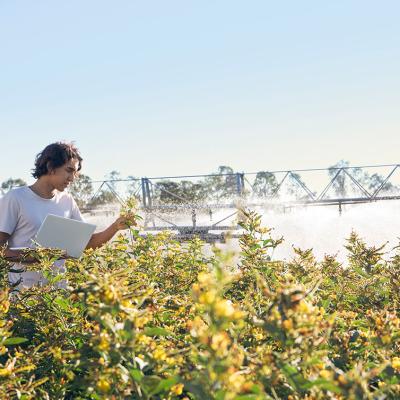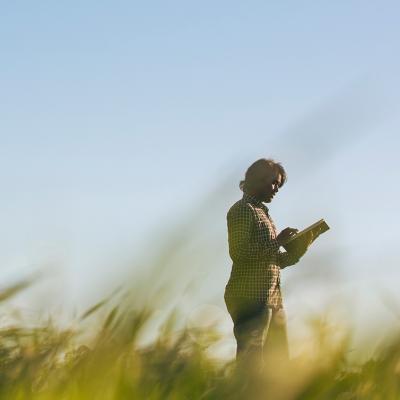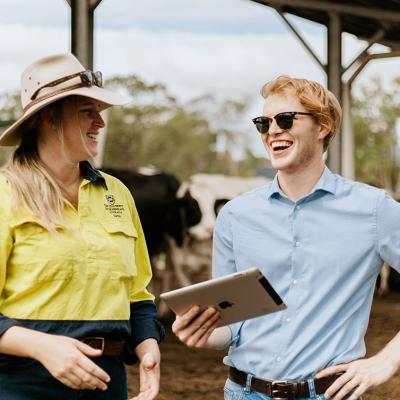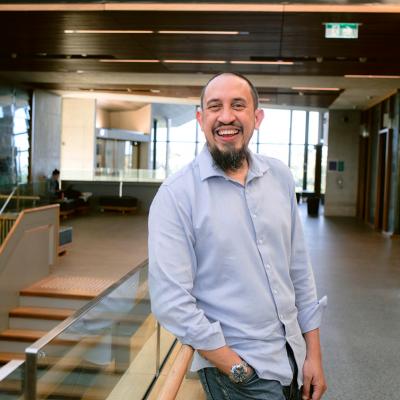The future of agriculture and animal science is rapidly evolving, driven by innovation, sustainability, and the need for adaptable leadership.
With a UQ postgraduate program in agricultural and animal science, you'll embark on a transformative journey where you'll explore everything from global food security to cutting-edge animal science technologies.
Here’s a closer look at the key courses that will shape your future in these critical fields.
Agriculture courses
Postgraduate agricultural science programs at UQ offer a diverse range of courses designed to equip students with comprehensive knowledge and skills in the field. Here are a couple of the courses you might find interesting.

International Agricultural Development
Agriculture is at the heart of global food security, economic development, and environmental sustainability. This course explores the complex challenges and opportunities in international agricultural systems, equipping you with the skills to contribute to sustainable solutions worldwide.
"This course introduces students to some of the key issues that emerge in international agricultural development,” says course lecturer Dr Zannie Langford.
“The first part of the course introduces students to theories of agricultural development in smallholder farming contexts, including development pathways, strategies, and patterns in different international contexts."
By analysing real case studies from diverse regions, you'll delve into topics such as:
- smallholder farming
- food security
- trade policies
- climate-resilient agriculture.
For Master of Agricultural Science student Suvansh Salwan, the course provided invaluable insights into sustainable livelihoods, technological change, and development financing.
"This course highlighted major global challenges like climate change, Indigenous agricultural development, and financial barriers," he says.
"It deepened my understanding of how solutions like precision farming, sustainable land use, and impact investment can drive long-term agricultural growth."
One of the highlights of the course is the opportunity to collaborate on international projects, working with leading NGOs, government agencies, and research organisations.
"The case studies were incredibly valuable. They helped me understand the social, cultural, and economic complexities of different regions and critically reflect on global agricultural challenges."
You’ll also gain exposure to UQ’s world-class research in tropical and subtropical agriculture, preparing you for impactful roles in global food production, policy, and rural development.
Global Challenges in Agriculture
From feeding a growing population to mitigating climate change, agriculture faces some of the world’s most pressing challenges. This course takes a deep dive into issues like:
- soil degradation
- water scarcity
- biodiversity loss
- the impact of emerging technologies on food production.
"This dynamic course is perfect for students in agriculture, food science, agribusiness, and environmental sciences, equipping them with the skills and knowledge to thrive in a rapidly changing world,” says Susanne Schmidt, a Professor at UQ's School of Agriculture and Food Sustainability.
"With guidance from global experts, you'll dive into big challenges like food security, climate change, and globalisation. You'll learn how to think ahead and shape the future while finding sustainable ways to produce nutritious food."
Master of Agricultural Science student Nicky Parker found the course to be unlike any other she had taken.
"I found Global Challenges in Agriculture to be really exciting as it went beyond learning and applying content... the focus is on analysis and evaluation of information, with autonomy to select contexts of interest to students,” she says.
“Students are also required to reflect on implications for their future engagement in agricultural fields and how this relates to sustainable development goals. Working with other students during tutorials allowed me to broaden my understanding of agriculture in different parts of the world."
A standout feature of this course is its strong industry engagement. You’ll benefit from interactive learning through debates and idea-sharing sessions, case study analysis, and hands-on experience at UQ’s world-leading agricultural research facilities, including experimental farms and digital agriculture labs.
"This course will help you grow as a leader and craft strategies for a sustainable future," says Susanne.
"You’ll learn about the future of agriculture, explore what foods will keep us and the planet healthy, and become a leader in shaping tomorrow’s food systems.”

Leadership in Rural Industries and Communities
Strong leadership is essential for driving positive change in rural industries and communities. The Leadership in Rural Industries and Communities course provides a unique learning experience that goes beyond traditional leadership training.
"A key benefit of this course is its practical, reflective approach, where students develop their own leadership styles while learning how to navigate complex challenges in rural industries and communities," said UQ’s Associate Professor Severine van Bommel, who delivers the course.
“You’ll build expertise in strategic decision making, stakeholder engagement, and policy advocacy, equipping yourself to lead agricultural enterprises, policy initiatives, and community development projects with confidence.”
For Master of Animal Science student Vanya Singh, the course transformed her understanding of leadership.
“Before taking this course, I thought leadership was about having extensive knowledge and experience," she says.
"I wasn’t sure if I could be a leader myself, but this course helped me realise that leadership is more about supporting and encouraging a team rather than having all the answers.”
Designed for those who want to lead change in dynamic and often unpredictable environments, this course immerses students in various leadership scenarios. Through interactive simulations, mentorship programs, and field trips to rural enterprises, you’ll learn to manage conflict, negotiate effectively, and foster collaboration among diverse stakeholders.
The curriculum also addresses modern leadership challenges such as:
- managing rapid change
- working with uncertainty
- balancing economic, social, and environmental priorities in rural contexts.
“The biggest lesson I learned was the importance of understanding different perspectives before making decisions," says Vanya.
"In rural industries and communities, leadership is not just about implementing policies but also about listening to and negotiating with different stakeholders."
“One of the most impactful activities was the role-playing exercises in workshops, where we had to take on the role of different stakeholders in various scenarios. This was eye-opening because it made me step into the shoes of people with different perspectives, helping me understand how leadership decisions can affect different groups. It also helped me practise negotiation and conflict resolution in a safe learning environment, which will be incredibly useful in my future career in wildlife conservation.”
A key advantage of the course is its action learning approach – instead of just studying leadership, you’ll actively develop your skills through interactive exercises, case studies, and group projects.
“This ensures students leave with not only knowledge but also the confidence and ability to lead effectively in their industries and communities,” says Severine.
For Vanya, the experience has been invaluable in preparing her for a future in wildlife conservation and rural leadership.
“I would highly recommend this course, especially for students who are interested in wildlife conservation, policy-making, or working with diverse communities," she says.
"It has given me a strong foundation in leadership, negotiation, and stakeholder engagement – skills that are essential in any field that involves managing people and making informed decisions.”
Whether you're looking to lead a farming enterprise, work in agribusiness, or influence agricultural policy, this course provides the knowledge and networks to make a lasting impact.
Animal science courses
The Master of Animal Science program at UQ offers a comprehensive curriculum designed to equip students with advanced knowledge and skills. The program includes foundational courses, core courses, and two specialised fields of study: Production Animal Science and Wildlife Biology. Here are a couple of the courses that provide a deep insight into various aspects of animal science.

Animal Reproduction
Reproductive efficiency is crucial for livestock production, conservation breeding, and animal health. This course delves into animal reproduction, covering topics like:
- physiology
- endocrinology
- advanced breeding technologies.
You'll explore livestock and wildlife reproductive systems, learning to assess fertility, manage breeding cycles, and apply cutting-edge technologies.
“This is a pivotal course for students in animal-related fields," says UQ Lecturer Dr Andres Gambini.
"Understanding reproductive anatomy, physiology, and behaviour is essential in veterinary sciences, wildlife conservation, animal breeding, and livestock management.”
Master of Animal Science graduate Yolande Campbell credits the course with deepening her understanding of reproductive physiology and its role in conservation.
“This course helped me understand key topics like hormones, pregnancy, egg and sperm production, and even how the environment can affect fertility," she says.
"Knowing how reproduction works in different species is essential for protecting wildlife and managing animal populations.”
Now a PhD student researching marsupial and monotreme reproductive biology, Yolande also works as a wildlife officer, caring for koalas and other native animals.

Yolande believes the hands-on nature of the course made all the difference.
“I learn by doing, and without practical experience, I may not have been so enthralled by animal reproduction,” she says.
The practical learning in this course provides students with real experience in artificial insemination, embryo transfer, and fertility management.
A standout moment for Yolande was her first ultrasound session.
“I found the corpus luteum right away and felt such joy. I showed my classmates, and I knew then this was what I wanted to do – animal reproduction. Besides, who doesn’t love baby animals?”
The course also provided essential skills for Yolande's career.
“Understanding reproductive tract biology helps in spaying and castrating koalas with chlamydiosis and diagnosing wildlife pregnancies, and post-mortem skills allow efficient sample collection for my research,” she says.
Another highlight of the course is UQ's Gatton campus, home to cutting-edge breeding facilities and research labs, where students work directly with livestock and wildlife.
Yolande highly recommends the course for aspiring animal scientists, veterinarians, and conservationists.
“Reproduction spans domestic, exotic, and production animals, offering many career opportunities," she says.
"My expertise in koala reproduction secured me a casual tutor role at UQ and frequent speaking opportunities at work."
Whether aiming to boost agricultural productivity or contribute to conservation, this course equips you with expertise to drive innovation in animal reproduction. With rising demand for skilled professionals, the knowledge and practical experience gained will set you apart in the field.
Molecular Theory, Data and Application in the Animal Sciences
The future of animal science lies in molecular biology, big data, and advanced genetics. This course introduces you to cutting-edge techniques in genomic sequencing, bioinformatics, and molecular diagnostics, which are revolutionising livestock breeding, disease management, and animal health research.
Master of Animal Science graduate Frazer Johnson found the course invaluable. He credits the course with igniting his interest in molecular biology and research.
“Initially, I didn’t expect myself to be able to engage seriously with molecular biology theory and techniques,” says Frazer.
“However, the course was eye-opening in many ways and has made me curious to learn more about molecular biology and science in general. The course was delivered in an engaging and interactive fashion and has galvanised my interest in pursuing further study and a career in animal science research.”
"Not having a background in biochemistry or molecular biology, I found that I had to make a concerted effort to apply first-principles-thinking to keep up with the coursework. I can see the skill of first-principles-thinking becoming personally invaluable with the rise of artificial intelligence; in the coming decades, we might have to relearn much of what we know."
During the course, you’ll gain hands-on experience in modern molecular biology techniques, including skills that are essential for today's scientists like:
- PCR
- gel electrophoresis
- quantitative PCR
- metabolomics technologies.
Delivered by Dr Nick Hudson and Dr Farhid Soumeh, the course fosters interdisciplinary innovation.
“A key advantage of this course is the opportunity to cross-fertilise ideas and concepts between animal science, wildlife science, and biomedical science, fostering interdisciplinary innovation,” says Nick.
“You’ll also develop executive-level science communication skills, including the ability to verbally present a highly nuanced, complex scientific topic in just 5 minutes – a crucial skill for any science professional."
With access to UQ’s world-class animal genomics laboratories and state-of-the-art technologies, graduates of this course will be at the forefront of scientific advancements, opening doors to careers in biotechnology, animal health research, and genetic consultancy.
Study these courses at UQ
UQ’s postgraduate programs in agricultural and animal science offer a unique opportunity to gain in-depth expertise and hands-on experience in two of the world’s most vital sectors. Whether you’re aiming to innovate in agriculture or push the boundaries of animal science research, these courses provide the foundation you need to succeed.
Explore the programs that offer these course:
Agricultural Science
- Master of Agricultural Science
- Graduate Diploma in Agricultural Science
- Graduate Certificate in Agricultural Science
Animal Science










